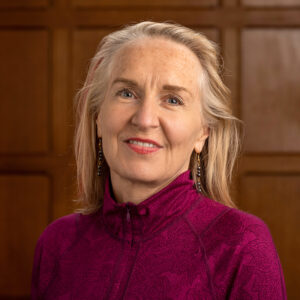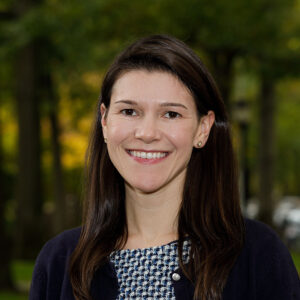Global health is a powerful driver of global affairs today. As the Covid-19 pandemic has demonstrated, disease outbreaks can restructure world economies, transform trade and travel, drive foreign policy, alter consumer behavior, and challenge every aspect of individual lives and social activities. The multifaceted nature of global health requires interdisciplinary analysis – engaging with economics, history, and politics, as well as with anthropology, law, and sociology, in addition to epidemiology, public health, and medical sciences. Interdisciplinary knowledge pertaining to health and society represents the cornerstone of our training. Deep understanding of global health as a field will serve our scholars today, and will ground their futures as they think, lead, and act in global contexts.
The GHS MAP is led and coordinated by Global Health Studies Program Director (Professor Catherine Panter-Brick), and with support from the Jackson School of Global Affairs.
Our Faculty Affiliates are an interdisciplinary group of scholars, researchers and practitioners in global health who offer advising and support to Global Health Scholars as they develop their interests and explore academic and professional opportunities in the field.
Advisory Board members are scholars and practitioners invited to provide guidance on the Global Health Studies Program.
The GHS MAP provides students rigorous training in and engagement with skills and knowledge relevant to global health research and practice. Beyond the academic components, it also offers students the opportunity to build and learn from a rich, interdisciplinary community of peers, scholars, and advocates who convene and collaborate on social events, workshops, speaker series, and other extracurricular activities.
The Advocates-in-Residence program brings leading advocates and practitioners working on diverse health issues to Yale for short stays.
About the Director
 Catherine Panter-Brick
Catherine Panter-Brick
Catherine Panter-Brick is the Bruce A. and Davi-Ellen Chabner Professor of Anthropology, Health, and Global Affairs at Yale University. She is an expert on risk and resilience, having spent three decades working with people affected by war, poverty, and marginalization. A medical anthropologist, Panter-Brick was trained in both human biology and the social sciences. She has extensive experience leading mixed-methods research, having directed over forty interdisciplinary projects in Afghanistan, Ethiopia, the Gambia, Jordan, Mexico, Nepal, Niger, Pakistan, Saudi Arabia, Tanzania, the UK and the USA. For her work in humanitarian areas, she received the Lucy Mair Medal, awarded by the Royal Anthropology Institute to honor excellence in the application of anthropology to the active recognition of human dignity.
Panter-Brick directs the Global Health Studies Multidisciplinary Academic Program, the Program on Conflict, Resilience, and Health and the Program on Stress and Family Resilience. She holds joint appointments in the Jackson School of Global Affairs and the Department of Anthropology, and a secondary appointment at the Yale School of Public Health. She is also Senior Editor of the interdisciplinary journal Social Science & Medicine, President of the Human Biology Association, and Head of one of Yale’s Residential Colleges. Schooled in France and the UK, she was a Research Associate of the Centre National de la Recherche Scientifique (CNRS), Senior Research Fellow at the Agence Française de Développement (AFD), Professor of Anthropology at Durham University, and Research Fellow at St Hugh’s College, Oxford University.
On the issue of resilience and mental health, Panter-Brick has been a keynote speaker at the United Nations, contributed to international media broadcasts, and presented at international iNGO dissemination events, the World Health Organization, the World Bank, and the United States Institute of Peace. She leads research initiatives to develop effective partnerships between scholars, practitioners, and policymakers. Her work with Syrian refugee youth in Jordan is an example of scientific research evaluating the extent to which interventions can alleviate stress, boost resilience, and improve lives in war-affected communities. She publishes extensively in biomedical and social sciences journals, and has coedited seven books, most recently Medical Humanitarianism (Penn Press 2015) and Pathways to Peace (MIT Press, 2014).
Her teaching at Yale includes interdisciplinary courses on global health equity, humanitarian interventions, conflict and resilience.
Program Manager

Cara Kiernan Fallon is a Lecturer in Global Health at the Jackson School of Global Affairs. She completed her postdoctoral training in Medical Ethics and Health Policy at the University of Pennsylvania, where she was also appointed as a Fellow in the Center for Public Health Initiatives and a Clark Scholar at the Penn Memory Center. Fallon received her PhD in the History of Science from Harvard University and MPH from the Yale School of Public Health. During and after the financial crisis of 2008, she worked in investment banking and investment management at Goldman Sachs. She earned a BA from Yale in History of Science/History of Medicine, graduating summa cum laude and Phi Beta Kappa.
Combining her training in history, ethics, public health, and industry, her research analyzes the marginalization of the elderly from basic frameworks of health, disparities in chronic disease, and the intersections of aging and disability studies. Her current book project, Living Long and Dying Young, examines cultural aspirations and medical innovations for aging since 1900. Her work has been supported by the Woodrow Wilson Foundation, the National Institutes of Health, the Smithsonian Institutes, and the Consortium for the History of Science, Medicine, and Technology.
She teaches courses in global health, ethics, and medical history and policy. She advises the Global Health Scholars in the Multidisciplinary Academic Program, where she also serves as the program manager. She welcomes student inquiries about global health, interdisciplinary scholarship, and the Global Health Studies program.
Please contact the program manager via our Contact Form.